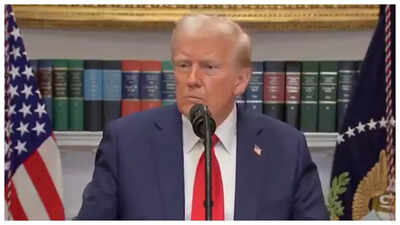ARTICLE AD BOX

US President Donald Trump
The decision of the US Department of State (DOS) to pause visa interviews for international students, has invited flak from various associations. Marco Rubio, Secretary, DOS has recently ordered a pause on consulate appointments for student and exchange visitor visas (F, M and J visa categories).
The move comes as the US government plans to expand social media checks for all student and exchange visitor visa applicants.Soon thereafter, a statement announced revocation of visas for Chinese students. “Under President Trump’s leadership, the US State Department will work with the Department of Homeland Security to aggressively revoke visas for Chinese students, including those with connections to the Chinese Communist Party or studying in critical fields.
We will also revise visa criteria to enhance scrutiny of all future visa applications from the People’s Republic of China and Hong Kong,” it states.
India and China are the main countries of origin of international students. According to the Open Doors Report, released last November, during the academic year 2023-24, there were 3.31 lakh Indian students in the US (constituting 29.4% of the total number of international students).
This was followed by 2.77 lakh Chinese students (24.6% of the total number of international students).Responding to the pause on visa interviews, Miriam Feldblum, President and CEO of the Presidents’ Alliance on Higher Education and Immigration said, “The State Department’s decision to pause visa interviews for international students during this crucial admissions period is deeply concerning. It will generate harmful delays and likely cause longer-term chaos.
In the immediate term, it disrupts existing processes and creates great uncertainty for students and campuses.
Alongside plans to expand the existing social media vetting and screening of all international student applicants, this decision continues a pattern of administrative actions, including the SEVIS student record terminations and visa revocations, that contradict America’s national economic, academic, and global interests.” “If unaddressed, this growing climate of fear, volatility, and uncertainty will weaken our nation’s prosperity and competitiveness. Deterring students from choosing American colleges and universities costs us the valuable contributions of international students to campuses, communities and the economy, and threatens America’s longstanding position as the world’s premier destination for international talent.
This is not about quotas, but about talent. A decline in new international enrolments will harm communities and regions across the country. International students fuel cutting-edge research and innovation and expose domestic students to ideas and approaches that prepare them to participate in the global economy. Every year, tuition revenues from international students support programs and funding streams that serve all students on our campuses,” she added.According to the Presidents’ Alliance, in 2023–2024, international students contributed nearly $44 billion to the US economy and supported over 378,000 jobs, making international education the seventh-largest US service export.‘Stand up for international students’ is a prominent post by FWD.US. On its website it stated that international students and graduates are critical to the STEM workforce and industries of the future.
These students drive innovation by performing essential work in university labs and classrooms and contributing to American companies while working on optional practical training (OPT). Tens of thousands of international students are positioned to graduate with degrees related to key fields like AI and semiconductors each year.
In addition, a quarter of the US billion-dollar startup companies were founded by a former international student who each created an average of 860 jobs. In total, 44% of these “unicorn” startups were started by someone outside the US. The Association pointed out that if America loses its reputation as the premier destination for international student education, it is not a status that it will be able to easily recover.



.png)
.png)
.png)
















 1 week ago
7
1 week ago
7









 English (US) ·
English (US) ·